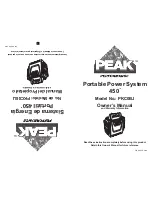
1.4.
CHARGING SAFETY INSTRUCTIONS
9
Familiarise yourself with the application and limitations of the charger as well as the potential hazards.
Also refer to the vehicle manufacturer’s hand book. IF IN ANY DOUBT CONSULT A QUALIFIED ELECTRICIAN.
9
Ensure the charger is in good order and condition before use. If in any doubt
DO NOT
use the unit, contact your Sealey stockist.
9
Use the starter/charger in the upright position only and ensure it is placed on a stable surface which will adequately support its
weight.
9
Ensure the charger is disconnected from the mains supply before attaching/detaching the power clamps to/from the battery.
9
Keep tools and other items away from the engine and ensure you can see the battery and working parts of engine clearly.
9
Ensure the output of the charger is the same voltage as the battery.
9
If battery has caps to access the battery fluid, remove the caps and check the fluid level before connecting the power clamps.
9
If necessary top-up the battery with distilled water by referring to the battery manufacturer’s instructions (Apply the personal safety
precautions described in part 1.3).
9
If the charger receives a sharp knock or blow the unit must be checked by a qualified service agent before using.
9
If the battery terminals are corroded or dirty clean them before attaching the power clamps.
9
Keep children and unauthorised persons away from the working area.
8
DO NOT
dis-assemble the charger for any reason. The charger must only be checked by qualified service personnel.
8
DO NOT
try to charge a non-rechargeable battery.
8
DO NOT
try to charge battery if battery fluid is frozen.
WARNING!
To prevent the risk of sparking, short circuit and possible explosion
DO NOT
drop metal tools in the battery area, or
allow them to touch the battery terminals.
8
DO NOT
allow power clamps to touch each other or to make contact with any metallic part of the vehicle.
8
DO NOT
cross connect power leads from charger to battery. Ensure positive (+/RED) is to positive and negative (-/BLACK) is to
negative.
8
DO NOT
pull the cables or clamps from the battery terminals.
8
DO NOT
use the charger outdoors, or in damp, or wet locations and
DO NOT
operate within the vicinity of flammable liquids or
gases.
8
DO NOT
use charger inside vehicle or inside engine compartment.
9
Ensure there is effective ventilation to prevent a build-up of explosive gases, and
DO NOT
cover or obstruct charger ventilation
louvres.
8
DO NOT
use the charger for a task for which it is not designed.
WARNING!
DO NOT
simultaneously charge batteries of different capacities or discharge levels.
WARNING!
If a fuse blows, ensure it is replaced with an identical fuse type and rating. Use only Sealey genuine parts.
9
When not in use, store the charger carefully in a safe, dry, childproof location.
9
An extension cord should not be used unless absolutely necessary. Use of an improper extension cord could result in a risk of fire
and electric shock. If an extension cord must be used, make sure:
• That the pins on the plug of the extension cord are the same number, size and shape as those of the plug on the charger.
• That the extension cord is properly wired and in good electrical condition.
• That the wire size is large enough for the AC ampere rating of the charger as specified.
9
To reduce the risk of electric shock, unplug the charger from the outlet before attempting any maintenance or cleaning. Simply
turning off the controls will not reduce this risk.
9
A marine (boat) battery must be removed and charged on shore. To charge it on-board requires equipment specially designed for
marine use.
CAUTION:
Only allow children at least 8 years old to use the battery charger. Give sufficient instruction so that the child is able to use the
battery charger in a safe way and explain that it is not a toy and must not be played with.
Instruct the child not to try and recharge non-rechargeable batteries because of the risk of eruption.
Examine the battery charger regularly for damage, it must not be used until it has been repaired.
T
his appliance can be used by children aged from 8 years and above and persons with reduced physical, sensory or mental capabilities
or lack of experience and knowledge if they have been given supervision or instruction concerning use of the appliance in a safe way and
understand the hazards involved. Children shall not play with the appliance. Cleaning and user maintenance shall not be made by children
without supervision.
2. INTRODUCTION
F
ully automatic 7-stage battery charger, designed to automatically select and charge 6V/12V/24V batteries, while also charging a variety
of GEL, AGM, lead acid and calcium batteries with auto chemistry selection. Zero volt battery charging, enabling recovery and charging of
a completely discharged battery (providing any load removed from the rechargeable battery). Old battery sulfation repair function. Reverse
polarity, short circuit, over temperature and over charging protection. Intuitive LED screen displays illuminated charging stages, volts and
amps output and battery capacity. Compact design with unique retractable hanging hook, and cable management system which allows the
clips to be stored neatly away when not in use.
3. SPECIFICATION
MODEL ....................................................... SPBC8 ................................................ SPBC12 ...........................................SPBC16
Supply: .............................................................
230V
......................................................
230V
.................................................
230V
Output: ...................................................
6V/12V/24V
............................................
6V/12V/24V
......................................
6V/12V/24V
Output Charge: ..................
8A @ 6/12V (4A @ 24V)
......................
12A @ 6/12V (6A @ 24V)
.................
16A @ 6/12V (8A @ 24V)
B
attery Range: ..................................
40Ah to 100Ah
.......................................
40Ah to 160Ah
.................................
40Ah to 200Ah
Cable Length:....................................................1.2M .......................................................1.2m .................................................1.2M
IP Rating: .......................................................... IP33 ....................................................... IP33 ................................................. IP33
Dimensions: .....................
193mm x 183mm x 80mm
......................
193mm x 183mm x 80mm
................
193mm x 183mm x 80mm
S
PBC8 SPBC12 SPBC16 Issue 1 22/01/2021
Original Language Version
© Jack Sealey Limited






















